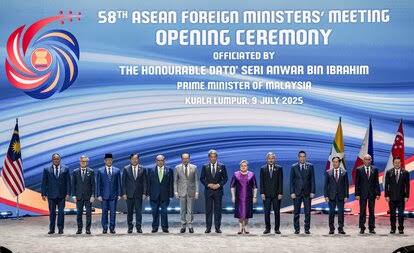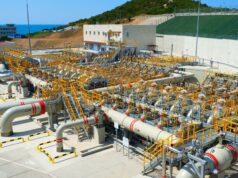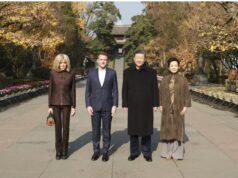Malaysia calls on ASEAN to confront looming U.S. tariffs

A meeting of the Association of Southeast Asian Nations (ASEAN) Foreign Minister is held at the Convention Centre in Kuala Lumpur Malaysia, July 9, 2025
Malaysian Prime Minister Anwar Ibrahim on Wednesday called for a collective response to the challenge of unilateral USA tariffs, addressing foreign ministers of the Association of Southeast Asian Nations at a time when unilateral trade measures under Donald Trump have fuelled economic uncertainty in the region.
“Tariffs, export restrictions and investment barriers have now become the sharpened instruments of geopolitical rivalry…ASEAN must confront this reality with clarity and conviction,” Anwar said, adding that the regional bloc should increase trade among its 10 members.
At the annual talks, the foreign ministers are expected to express concern over “counterproductive” unilateral tariffs in a joint communique, with a draft seen by Kyodo News saying they “risk exacerbating global economic fragmentation, and pose complex challenges to ASEAN’s economic stability and growth.”
ASEAN nations were hit with duties of between 10 percent and 49 percent under Trump’s “Liberation Day” tariffs announced on April 2, with a 90-day negotiation period extended to Aug. 1 after initially being scheduled to end Wednesday.
Trump on Monday notified 14 countries, including Japan, South Korea and six ASEAN members, of new tariff rates to take effect on Aug. 1.
Among the ASEAN members, three saw their rates reduced, with Cambodia’s lowered from 49 percent to 36 percent, Laos’ from 48 percent to 40 percent and Myanmar’s from 44 percent to 40 percent. Tariff rates for Thailand and Indonesia were maintained at 36 percent and 32 percent, respectively, while Malaysia saw a 1 percentage-point hike from its original 24 percent.
Vietnam had earlier struck a deal with the United States that reduced its rate to 20 percent from 46 percent.
ASEAN also includes the Philippines, Singapore and Brunei.
U.S. Secretary of State Marco Rubio is slated to attend ASEAN-sponsored foreign ministerial talks with partner nations to be held later this week in Kuala Lumpur.
According to a statement from the State Department, Rubio’s first trip to Asia as secretary of state is “focused on reaffirming the United States’ commitment to advancing a free, open and secure Indo-Pacific region.”
Tariff issues aside, the protracted civil war in Myanmar was high on the agenda at Wednesday’s meeting as Malaysian Foreign Minister Mohamad Hasan said all parties to the conflict should create “a conducive environment for elections.”
The chief of Myanmar’s military, which seized power in a February 2021 coup, said last month that a general election will be held in December and January. The party of ousted civilian leader Aung San Suu Kyi, who remains under detention, will effectively be excluded.
According to the draft joint communique, the ASEAN foreign ministers are likely to express concerns over the conflict and humanitarian crisis in Myanmar and urge the junta to adhere to a five-point consensus reached with other ASEAN members in April 2021.
Little progress has been made on implementing the consensus, which was aimed partly at ending the violence against the junta’s political opponents following the coup.
The military has continued bombing areas controlled by ethnic minority rebels and fighters aligned with the government-in-exile formed by ousted civilian leaders, despite a cease-fire declared after a powerful earthquake hit Myanmar in March.
The South China Sea, where territorial claims of some ASEAN members overlap with those of China, was also believed to be discussed Wednesday. China and the regional bloc held negotiations to draft a code of conduct to prevent maritime confrontations.
China’s top diplomat Wang Yi is expected to join the foreign ministerial talks with partner nations starting Thursday.




